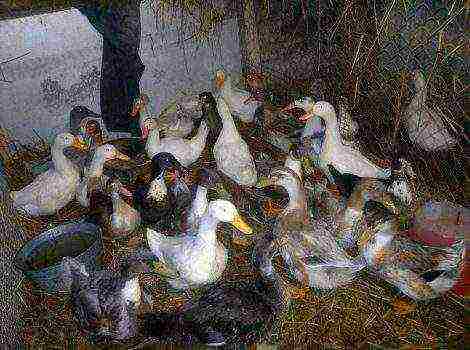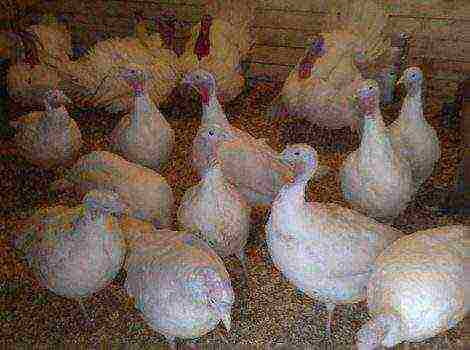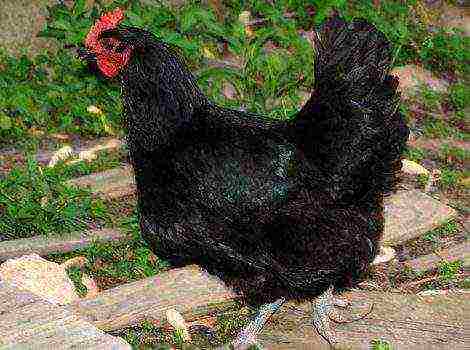Content
- 1 Symptoms and treatment of broiler diseases at home
- 1.1 Diseases of broiler chickens and how to treat at home
- 1.2 Diseases
- 1.2.1 Colibacillosis: antibiotic treatment, prevention for chickens and adults
- 1.2.2 Salmonellosis: what is it, how to cure chickens and adults
- 1.2.3 Aspergillosis
- 1.2.4 Pullorosis
- 1.2.5 Rickets
- 1.2.6 Marek's disease: what is it, treatment, care and prevention for chickens at one month of age
- 1.2.7 Bird flu
- 1.2.8 Chicken pox: raising healthy chickens
Symptoms and treatment of broiler diseases at home
Broilers are the same chickens, only they are raised purely for meat and eggs. The difference is that they grow rapidly and can reach 1.5 kilograms in 2-3 months.
But this, of course, will only be with proper care. In addition to proper feeding and maintenance, it is imperative to monitor the health of the bird. Broilers, like chickens, are susceptible to infectious diseases, the appearance of which can completely kill all individuals.
Therefore, when the first symptoms of the disease are detected, appropriate treatment is immediately started. In this article, we will take a closer look at broiler diseases and their treatment at home. We will find out why broilers wheeze, sneeze, go blind and what to do about it.
Diseases of broiler chickens and how to treat at home
During the breeding and raising of broilers, it should be borne in mind that the bird is highly susceptible to various diseases, especially in the first days of its life up to one month of age. First of all, attention is paid to the suspicious behavior of the bird. - lethargy, decreased appetite, apathy. Perhaps this is a temporary phenomenon and after a certain period the bird will regain appetite and mood. But not always. Sometimes this condition gets worse and causes severe symptoms. So how is it determined whether a bird is sick or not?
Newbies often have problems. In this case, pay attention to the first symptoms.
In addition, it is worth paying attention to common symptoms that can be the causes of infectious diseases:
What to do if chickens sneeze?
Let's start with the most common problem - why do chickens and chickens sneeze? Broilers can sneeze for various diseases, usually this symptom is caused by viral colds. It is better to call a veterinarian when a sneeze occurs and conduct an examination so that he has already established the cause. In the place where birds are kept, all drafts and dampness should be eliminated.
It is advisable to install a ventilation system, install heaters. The lamps should be at a certain level above the heads of broilers, but in no case at their level or below. Often, improperly installed lamps lead to overheating of birds, and then, when individuals leave for a while to eat, their body cools down and as a result they catch a cold.
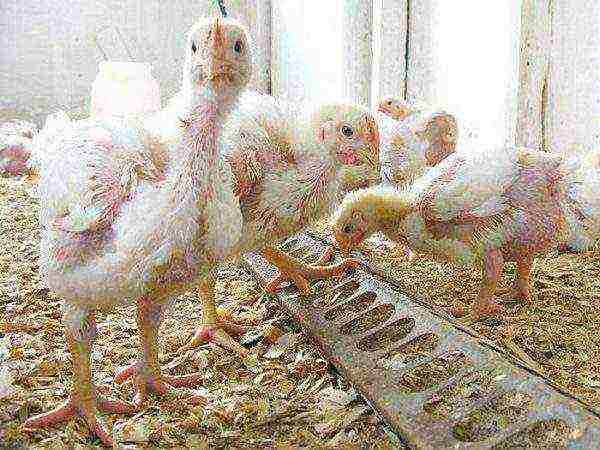
Why chickens and broiler chickens sneeze, we figured out, now we will find out what to do. If sneezing has just appeared, then it is advisable to immediately powder the nostrils with streptocide powder. To do this, the powder is collected with a cotton swab and rubbed well into the nostrils of the bird. This will prevent the infection from spreading further into the bronchi and lungs.Additionally, broilers need to be drunk with antibiotics - chloramphenicol and tetracycline. For 1 liter of water, add 1 tablet. They are given antibiotics for 4 days.
But nevertheless, when a sneezing appears, it is worth contacting a veterinarian, because a similar symptom can be the cause of dangerous diseases such as bird flu, aspergillosis, chicken pox and other serious illnesses.
Why do chickens cough?
Now let's move on to the question of why broilers and chickens are coughing and what to do? Broilers can cough for a variety of reasons. Sometimes a cough is caused by a cold due to drafts or increased dampness. In these cases, it is better to insulate the house, install an additional heater and provide adequate ventilation. Additionally, the bird is fed with vitamins and antibiotics.
But a cough is not always accompanied by colds, this symptom can be the cause of a serious and even fatal illness. - bird flu, aspergillosis and other pathologies.
For the treatment of diseases of chickens, the following drugs are suitable:
- Tetramisole 10
- Baycox
- Metronidazole
- Enroxil
Why do chickens wheeze?
Now let's figure out what to do if the chickens wheeze and even die. Wheezing, like coughing and sneezing, is accompanied by a cold. In these cases, the place where broilers are kept is checked for drafts and dampness. If these malfunctions are found, the poultry house is returned to normal, additional heating means are installed.
The bird is given vitamins and antibiotics until symptoms disappear.
But do not be sure that wheezing, coughing, sneezing are signs of a cold. Quite often, the symptom indicates the occurrence of a serious illness, which can be determined by a veterinarian. And if the disease is triggered, the bird can begin to die.
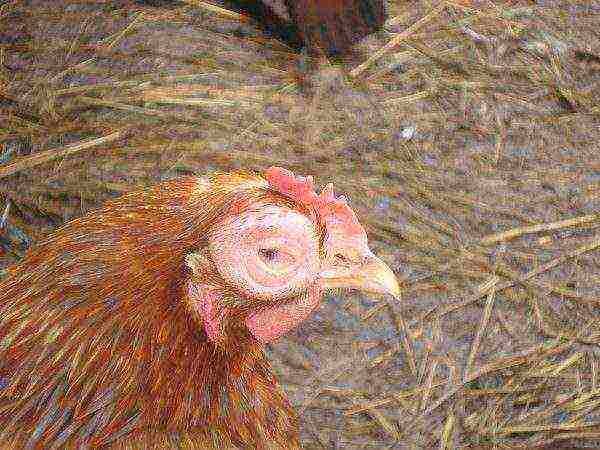
Why do chickens vilify?
The appearance of diarrhea can be the first signal that the bird is affected by infectious diseases. It is worth paying attention to the composition and type of liquid stools. If it has a light mucous membrane with impurities, and later a greenish color appears, then this indicates the presence of an infection.
In these cases, you need to immediately provide appropriate treatment, because the infection can instantly affect the entire livestock. Broiler chickens begin to carry on with such infectious diseases as salmonellosis, colibacillosis, bird flu.
Runny nose
A runny nose in birds is usually due to a cold, but not always. Usually, when a runny nose occurs, a complete check of the chicken coop is done, and all possible drafts and dampness are eliminated. Also, in case of a cold, the birds are given vitamins and appropriate antibiotics.
It is imperative that when a runny nose occurs, they turn to a veterinarian, he conducts an examination and, in the presence of serious diseases, provides appropriate treatment. What diseases can be accompanied by a runny nose: colicbacteriosis, Marek's disease, chicken pox, bird flu and others.
Symptoms of Broiler Leg Disease
Sometimes birds may have pain in their legs, this symptom is determined by the behavior and gait of broilers. Individuals can simply fall on the spot, while their legs move to the sides. This is a signal that the bird has a serious medical condition that has caused leg problems.
Together with leg disease, poor appetite, lethargy, and weakness are observed. When this condition appears, you should immediately contact your veterinarian, because leg problems are the cause of serious pathologies. Often leg diseases are observed with salmonellosis, rickets, Marek's disease.
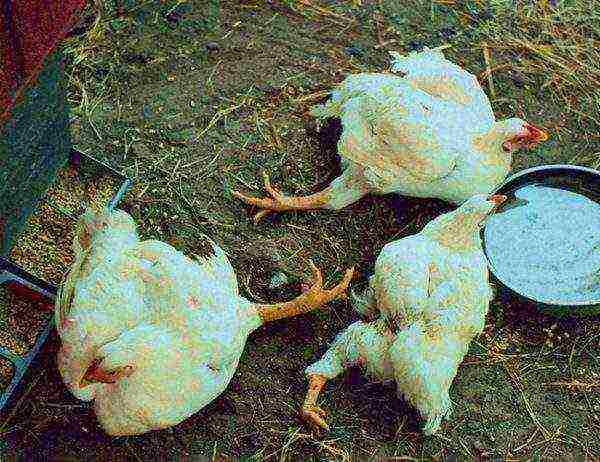
What if the chickens start to go blind in one eye and die?
Sometimes broilers develop blindness. A chicken can even go blind in one eye. Blindness is the cause of serious infections and should be treated immediately if they occur. Otherwise, the infection can instantly affect other individuals.
Blindness occurs with salmonellosis, Marek's disease.
However, it is not enough to know the reasons, you need to have an idea of \ u200b \ u200bthe treatment of serious diseases. Many pathologies can cause serious harm up to the death of the entire livestock. Therefore, in order to prevent unpleasant consequences, appropriate treatment should be provided in time.
Diseases
Colibacillosis: antibiotic treatment, prevention for chickens and adults
This is a dangerous disease that completely affects all individuals. The fact is that the causative agents of colibacillosis are constantly present in the environment. If hygiene is not observed, active development of bacteria can occur, which at the same time will infect almost all internal organs of individuals.
Symptoms of the disease:
- disorders of the digestive tract;
- loss of appetite;
- the occurrence of an increase in body temperature;
- lethargic and depressed state.
Treatment
For the treatment of colibacillosis, antibiotics are used - terramycin and biomycin. These products are added directly to the feed in powder form. Together with antibiotics, it is recommended to give vitamins every day and premixes together with feeding 1-2 times a day. Treatment is carried out 4-5 days until complete recovery.
Prophylaxis
To prevent this disease, only fresh and balanced feed is introduced into the broilers' diet. For prevention, the entire chicken population is vaccinated against this disease.
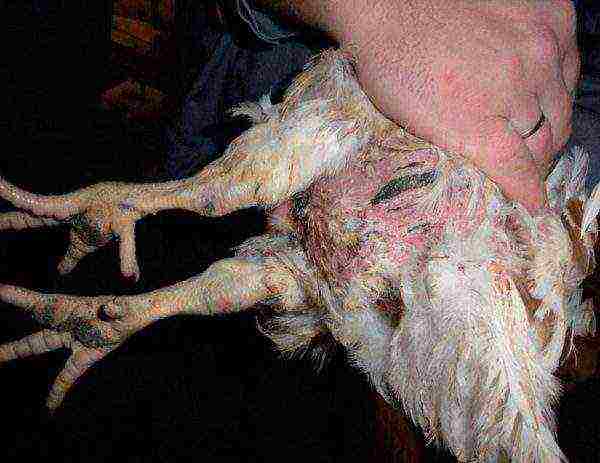
Salmonellosis: what is it, how to cure chickens and adults
Salmonellosis is a disease of the gastrointestinal tract. The causative agents of the disease are Salmonella bacteria. It is transmitted by airborne droplets from infected birds to healthy ones. Birds often become infected through feed. This infection affects juveniles.
Symptoms:
- the eyes become swollen and watery;
- the cloaca becomes inflamed;
- there is no appetite during heavy drinking;
- diarrhea occurs;
- swollen legs;
- the growth and development of chickens is slowed down.
How is treatment and prevention carried out?
As soon as salmonellosis is diagnosed, treatment is started immediately. Treatment is carried out with a course of furazolidone and streptomycin. For chicks, it is recommended to carry out prophylaxis - vaccination with immune serum is done.
Veterinary experts recommend slaughtering the bird immediately after salmonellosis is cured. If the disease occurs in at least one individual, the rest of the bird is watered with a solution of chloramphenicol.
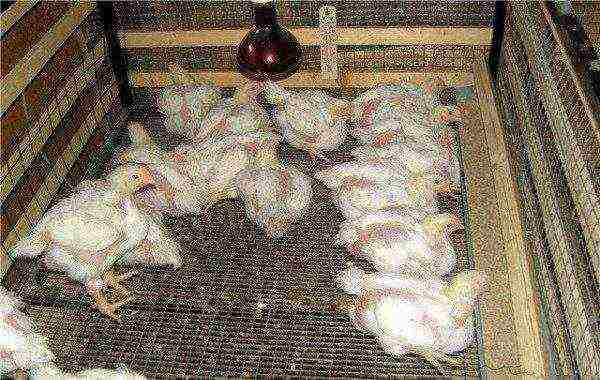
Aspergillosis
It is a viral disease that affects the respiratory tract of young individuals. It belongs to the most dangerous infections.
Symptoms:
- a state of apathy and lethargy;
- wheezing appears;
- sometimes coughing and sneezing;
- lack of appetite.
Treatment and prevention
This infection can only be treated with antibiotics. Medicines and dosages are prescribed by your veterinarian.
Preventive measures should be aimed at improving conditions of detention. Perhaps there are drafts, dampness in the chicken coop, so all this should be eliminated. The room needs to be insulated, it is advisable to install a heater and establish a ventilation system.
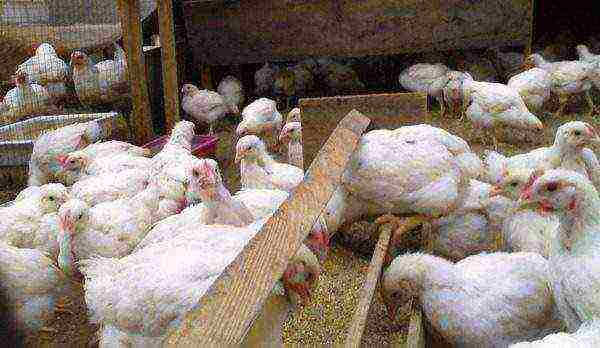
Pullorosis
This infection is caused by a bacterium called Bacillus pullorum. It is very difficult to determine this disease, because at the first stage it almost does not manifest itself in any way and can begin to develop already in the egg with the embryo.
Symptoms:
- the occurrence of white diarrhea;
- rapid and labored breathing;
- there is an exhaustion of young individuals, broilers often fall;
- birds have constant thirst.
How to treat and prevent
Affected individuals are placed in isolated rooms and treated with biomycin. All broilers, regardless of whether they are sick or not, add furazolidone to the feed.
As a preventive measure, constant ventilation of the broiler housing is carried out. It is also necessary to isolate infected individuals in time.
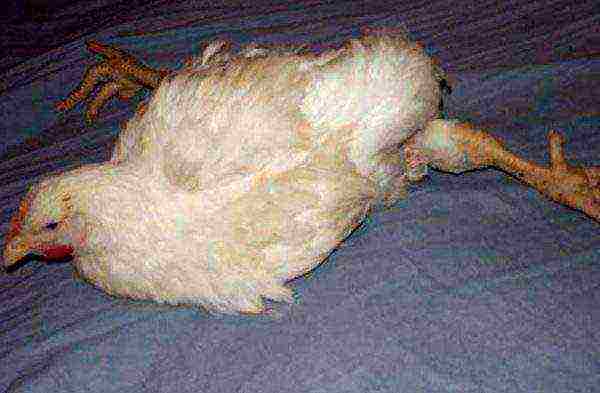
Rickets
This disease occurs in chickens. It appears due to a lack of calcium and vitamin D.
Symptoms:
- the chicks give up their legs and when they walk they fall on them;
- there is a slowdown in growth and development;
- chicks become depressed, lethargic, apathy appears.
Treatment and prevention
During the treatment of this condition, vitamin preparations are prescribed. Various premixes with a high calcium content are added to the feed.
Be sure to follow preventive measures - it is not advisable to keep a large number of young animals in one cage. In addition, you need to carry out periodic walks in the fresh air.
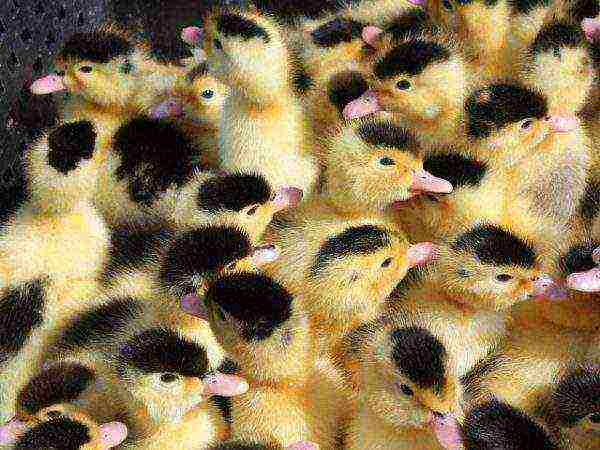
Marek's disease: what is it, treatment, care and prevention for chickens at one month of age
This pathology is mainly found in adult broilers. The virus infects the nervous system and the eyes of the bird.
Symptoms:
- there is a modification of the iris of the eye and the pupil. The result is complete blindness;
- coordination of movements and motor functions is impaired. Broilers have leg pain and limp when walking;
- during the illness, goiter paralysis occurs, which leads to complete exhaustion;
- mucous membranes become pale.
How to treat and prevent
Since this is a serious and dangerous disease, it cannot be cured, therefore it is important to make an accurate diagnosis. After determining the disease, the bird must be slaughtered immediately.
Bird flu
This is a dangerous viral infection. It affects the respiratory tract and the gastrointestinal tract.
Symptoms:
- cough, runny nose, sneezing;
- high body temperature;
- a state of apathy and lethargy;
- diarrhea.
How to treat and prevent
This disease does not respond to treatment. After bird flu is detected, the bird is immediately killed.
As a preventive measure, strict adherence to hygienic and sanitary standards for keeping poultry is necessary. It is worth remembering that bird flu is especially dangerous for the human body.
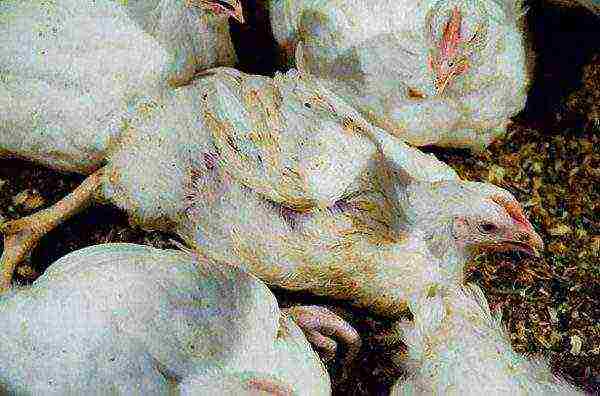
Chicken pox: raising healthy chickens
Chickenpox is spread by rodents and skin parasites. The causative agent of the disease has a high persistence in the environment. As a result of the disease, the internal organs and the mucous membrane of the eyes are affected.
Excellent drugs for the treatment of broiler diseases:
- Solicox
- Amprolium 30%
- Enrofloxacin
- Nifulin forte
Symptoms
- sneezing, runny nose, cough;
- clear red spots may appear in open areas of the body, which subsequently transform into scabs;
- an unpleasant odor emanates from the affected birds;
- the affected individuals have heavy breathing and difficulty swallowing;
- there is a state of weakness, lethargy and depression.
How to treat and prevent
This disease is treatable only in the initial stages. Therefore, you should not immediately slaughter a bird, but carry out medical procedures using glazolin, boric acid, furacilin solution.
As a preventive measure, it is necessary to periodically disinfect and clean the house.
Broiler diseases are almost the same as chicken diseases and infections. The only difference is the spread of infection in broilers is fast, this is due to the fact that birds are kept in a confined space.For this reason, it is imperative to conduct regular veterinary examinations and carry out appropriate prophylaxis.
